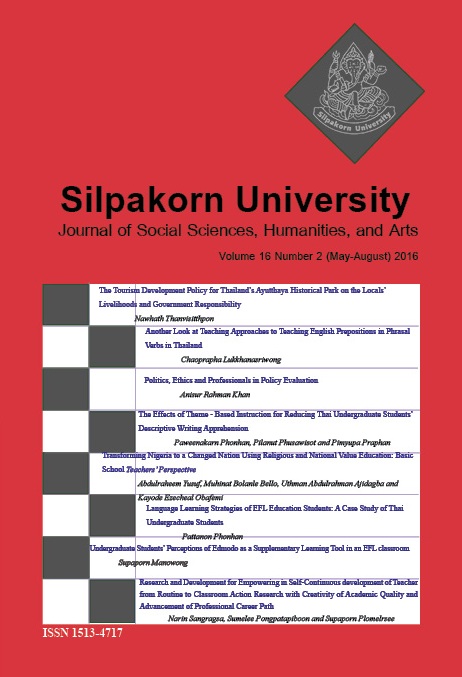Language Learning Strategies of EFL Education Students: A Case Study of Thai Undergraduate Students
Main Article Content
Abstract
This research study was aimed to investigate the overall language
learning strategies employed by Thai Education students at tertiary level
in Thailand, which purposively grouped regarding language proficiency,
gender and field of study. The participants of the study were 165
second- year students including 42 Thai language students, 41 Social
studies students, 43 Mathematics students and 39 Science students. The
language learning strategy questionnaire, which adapted from Oxford
(1990) was used as the main instrument. Simple descriptive statistic, Pos
Hoc test and ANOVA were used in the data analysis. The findings found
that Compensation strategies was the most frequently used, while Social
strategies was the least frequently used. Moreover, the overall language
learning strategies in relation to language proficiency, gender and field
of study of Thai Education students were different but not a meaningful
significance level of .05.
Downloads
Article Details
All rights reserved. Apart from citations for the purposes of research, private study, or criticism and review,no part of this publication may be reproduced, stored or transmitted in any other form without prior written permission by the publisher.
References
Bremner, S. (1999) Language Learning Strategies and Language Proficiency: Investigating the Relationship in Hong Kong. Canadian Modern Language Review 55(4): 490–514.
Chang, S. J. (1991) A Study of Language Learning Behavior of Chinese Students at the University of Georgia and the Relation of These Behaviors to Oral Proficiency and Other Factors. Unpublished Ph.D dissertation, University of Georgia, Athens, United States.
Chang, Y. P. (2003) Factors Affecting Learning Strategy Choice: A Study of EFL Senior High School Students in Taiwan. Texas: A&M University.
Dhanarattigannon, J. (1990) An Investigation on English Language Learning Strategies of the Good and Poor First Year Students at Silpakorn University at Sanamchan Palace Campus. Unpublished master thesis, Mahidol University, Thailand.
Ehrman, M. E. and Oxford, R. L. (1989) Effect of Sex Differences, Career Choice and Psychological Type of Adult Language Learning Strategies. The Modern Language Journal 73(1): 1-12.
Ellis, R. (1997) Second Language Acquisition. New York: Oxford University Press.
Foley, J. A. (2005) English in Thailand. RELC Journal 36(2): 223-234.
Green, J. M. (1991) Language Learning Strategies of Puerto Rican University Students. Paper presented at the annual meeting of Puerto Rico TESOL, San Juan, PR.
Green, J. M. and Oxford, R. L. (1995) A Closer Look at Learning Strategies: L2 Proficiency and Gender. TESOL Quarterly 29(2): 261-297.
Gu, Y. (2003) Fine Brush and Freehand: The Vocabulary Learning Art of Two Successful Chinese EFL Learners. TESOL Quarterly 37(1): 73–104.
Intaraprasert, C. (2000) Language Learning Strategies Employed by Engineering Students Learning English at the Tertiary Level in Thailand. Unpublished Ph.D dissertation, University of Leeds, England.
Intaraprasert, C. (2003) Classroom – Independent Language Learning Strategies Used by Students Learning English at Suranaree University of Technology. Unpublished research, Suranaree University of Technology, Nakhon Ratchasima, Thailand.
Kayad, F. (1999) Language Learning Strategies: A Malaysian Perspective. RELC Journal 39: 221-240.
Kotarputh, R. (2011) Language Learning Strategies of EFL Business Students: A Case Study of Thai Business Students. Unpublished master thesis, Mahasarakham University, Mahasarakham, Thailand.
Lappayawichit, R. (1998) An Investigation of English Language Learning Strategies and Their Relation to the Achievement of the First-Year Arts at Chulalongkorn University. Unpublished master thesis, Mahidol University, Nakhon Pathom,Thailand.
Merrified, J. (1996) Examining the Language Learning Strategies Used by French Adults Learners. Unpublished Ph.D dissertation, Aston University, United States.
Nation, I. S. P. (1990) Teaching and Learning Vocabulary. New York: Newbury House.
Naiman, N., Maria, F., Stern, H. H. and Todesco, A. (1975) The Good Second Language Learners. Toronto, Ontario, Ontario Institute for Studying in Education, OISE Press.
Noguchi, T. (1991) Review of Language Learning Strategy: Research and Its Implications. Unpublished master thesis, Tottori University, Tottori, Japan.
Office of the National Education Commission. (2001) Education in Thailand: 2001/2002. Bangkok: Kurusapa, Lardpao Press.
O’Malley, J. M., Chamot, A. U., Stewner-Manzanares, G., Küpper, L. and Russo, R. P. (1985) Learning Strategies Used by Beginning And Intermediate ESL Students. Language Learning 35(1): 21-46.
O’Malley, J. M. and Chamot, A. U. (1990) Learning Strategies in Second Language Acquisition. Cambridge: Cambridge University Press.
Oxford, R. L. (1990) Language Learning Strategies: What Every Teacher Should Know. New York: Newbury House Publications.
Oxford, R. L. and Nyikos, M. (1989) Variables Affective Choice of Language Learning Strategies by University Students. The Modern Language Journal 73(3): 291-299.
Park, G. (1997) Language Learning Strategies and English Proficiency in Korean University Students. Foreign Language Annuals 30: 211 – 221.
Peacock, M. and Ho, B. (2003) Student Language Learning Strategies across Eight Disciplines. International Journal of Applied Linguistics 13(2): 179 -200.
Prakongchati, N. (2007) Factors Related to the Language Learning Strategy Use of Thai University Freshmen. Unpublished PhD. Dissertation, Suranaree University of Technology, Nakhon Ratchasima, Thailand.
Prakongchati, N. (2012) The Use of English Language Learning Strategies by Thai Government University Freshmen. Silpakorn Educational Research Journal 4(1): 59-73.
Shamis, W. A. (2003) Language Learning Strategy use in Palestine. TESL-EJ Journal 7(2): 20-33.
Silapasatham, S. (1999) The Development of Teachers of English in Primary Schools. Bangkok: The Office of the Education Council.
Siriwan, M. (2007) English Vocabulary Learning Strategies Employed by Rajabhat University Students. Unpublished PhD. Dissertation, Suranaree University of Technology, Nakhon Ratchasima, Thailand
Teacher’s Council of Thailand. (2003) Teacher and Educational Personnel Council Act, B.E. 2546. [Online URL: https://thailaws.com/law/t_law/tlaw0450.pdf] accessed on November 7, 2014.
Thongsukkaew, S. and Rampai, N. (2013) A Study of Problems and Needs in Developing Competency of Undergraduate Students’ Rajabhat University. International Proceeding of Economics Development & Research 70(13): 13-16.
Tran, T. V. (1988) Sex Differences in English Language Acculturation and Learning Strategies among Vietnamese Adults Aged 40 and over in the United States. Sex Roles: A Journal of research 19: 747 – 758.
Wenden, A.and Rubin, J. (1987) Learning Strategies in Language Learning. London: Prentice Hall ELT.
Wharton, G. (2000) Language Learning Strategy of Bilingual Foreign Language Learners in Singapore. Language Learning 50(2): 203-243.


